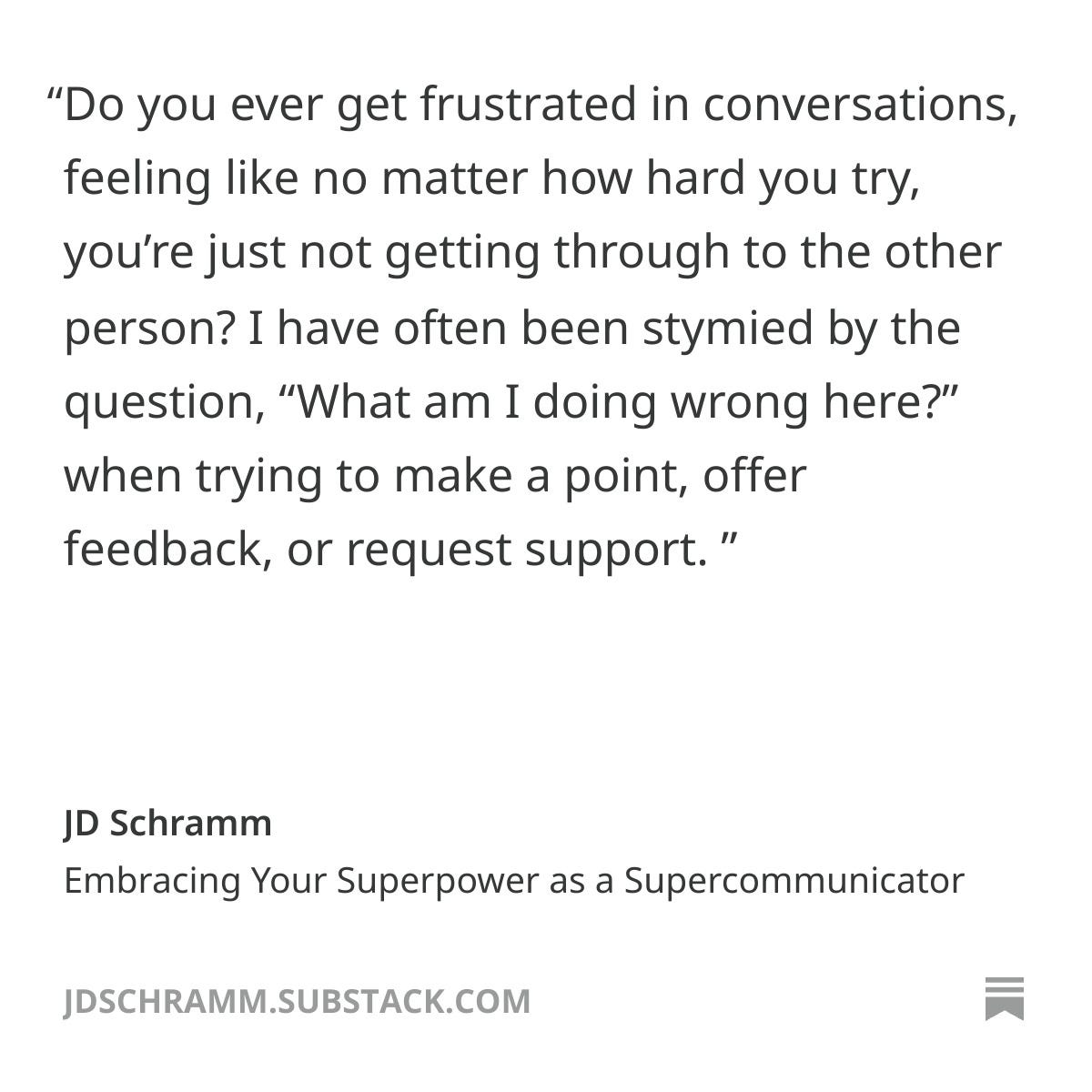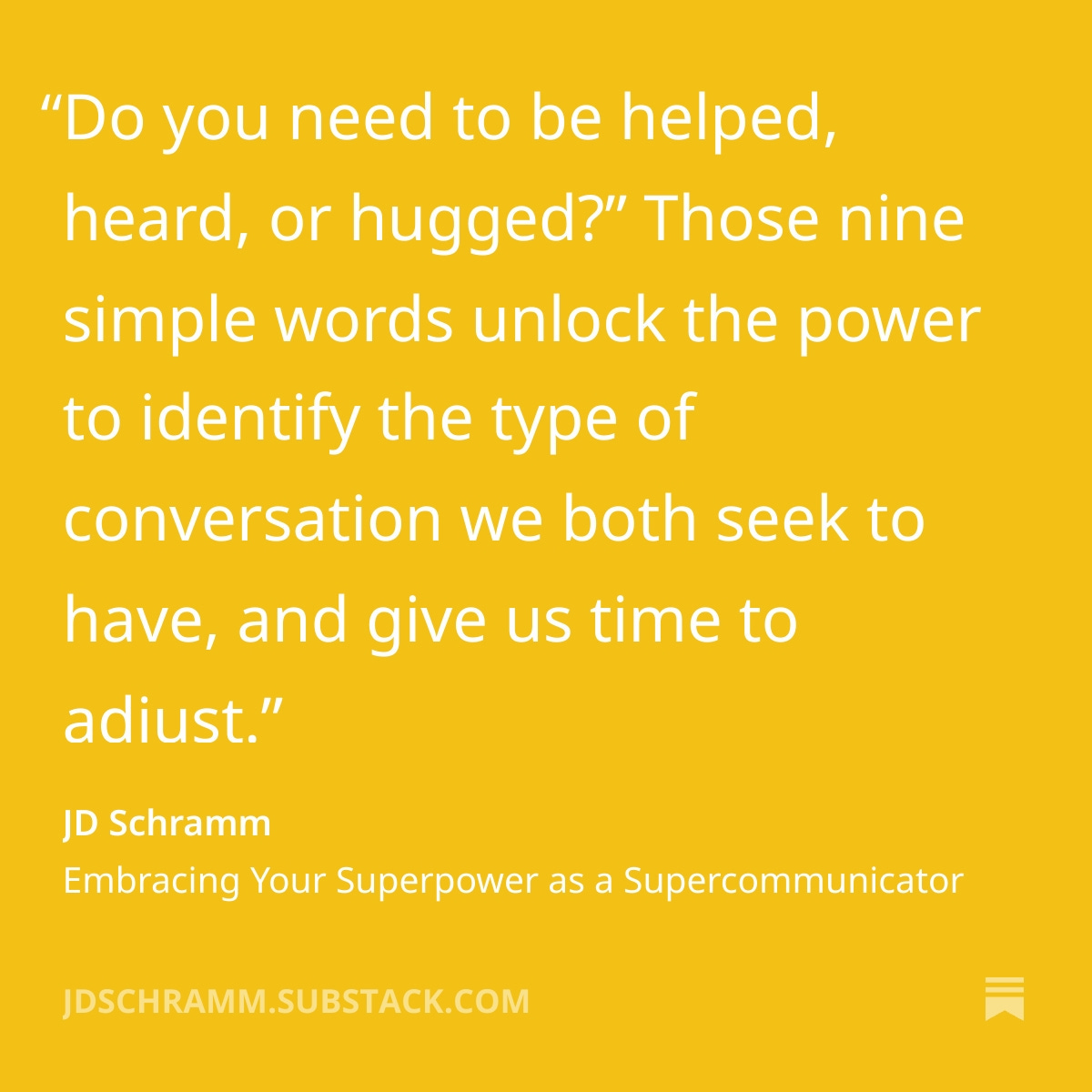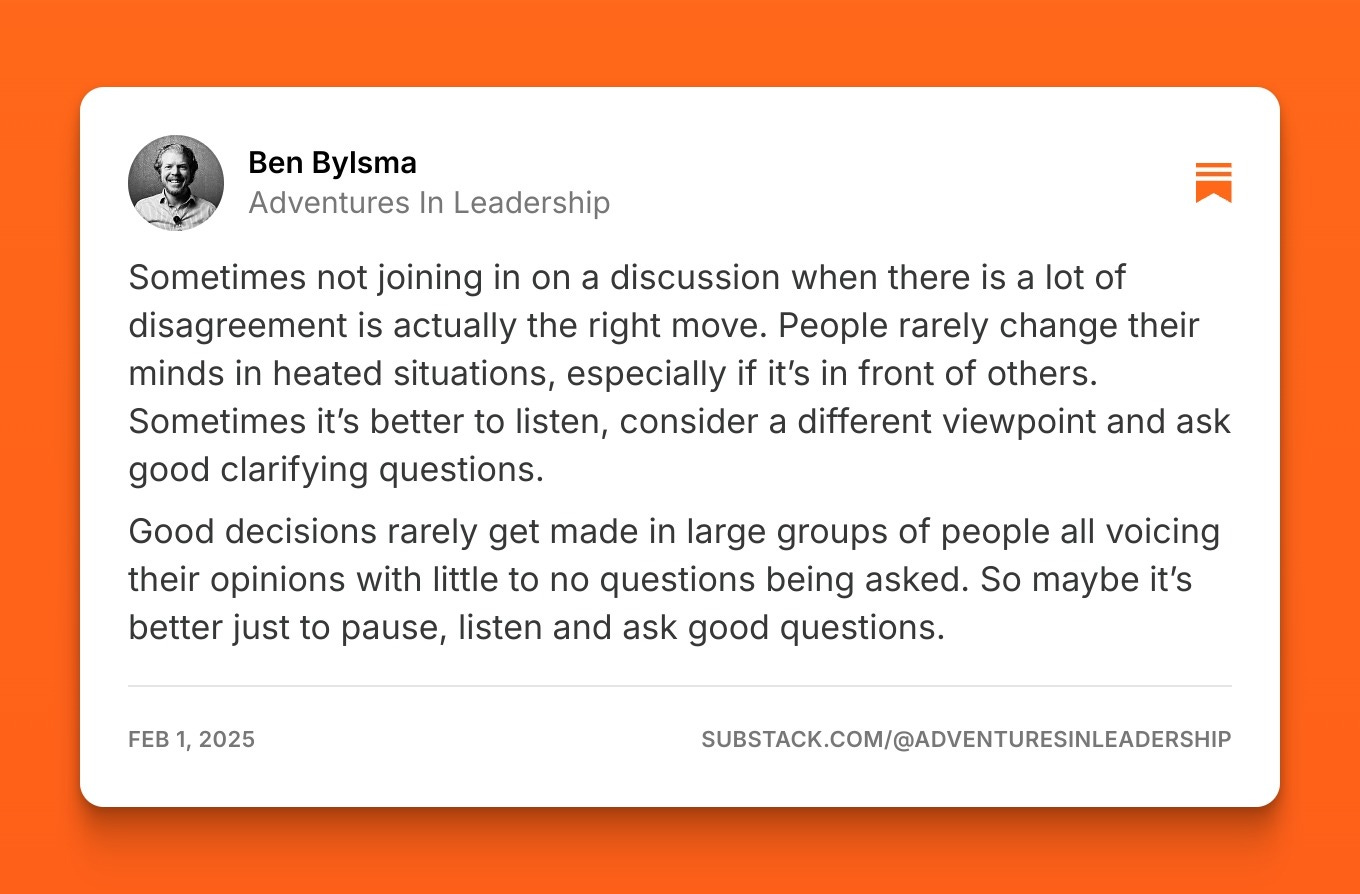Frustrating Conversations, Heated Situations, Stress at Work, Increased Respect and Why Weekly Meetings
What I learned this week from Substack writers and topical sources in Communication Intelligence
Welcome to a new feature at Communication Intelligence (the second issue):
This is Weekly Finds, from writers, articles and Notes on Substack. I couldn’t include everything “great” I found. Here are this week’s top picks:
Source: Communication Matters, by JD Schramm
I don’t know about you, but “I’ve been there” in the types of conversations that Schramm talks about, with family (children, former spouse) a couple of friends, old dates, people in business transactions, clients, people in normal public interactions.
It’s a thing. Maybe it’s me! It’s not my norm yet has happened.
I like the question, “What am I doing wrong here?” that Schramm uses.
Often, we likely think, “why are they not understanding?” I know I’ve had people think the same: “Why is he so thick (Oxford: unintelligent; stupid”)! He’s incredibly dense!”
We think that our level of communication is always clear. It’s not.
My youngest child, when they were a pre-teen, would get angry with me when they would incompletely communicate. This led to them yelling in frustration, storming off and slamming the bedroom door. Always the bedroom door! “Don’t slam that…” Slam!
One time, I “earned” three consecutive slams. This, from a person who is habitually mild-mannered, showing you just how agitating that frustration in communications can be for someone.
“I am on your team,” I would go tell her. “I want to understand. Please be patient when I ask for more information. I care!” I would say.
Now, stop slamming the door in frustration.
Maybe, we can benefit from “What am I’m doing wrong here?”
As the kids (younger generation) say, “I feel attacked.” Is this mostly a male thing, failing to think and respond in this manner? I contend “no” despite us being the normal offenders. Me: Guilty.
What Schramm says is food for thought, for me, and maybe many of us.
Source: Adventures in Leadership, by Ben Bylsma.
What stands out in this quote for me is that “People rarely change their minds in heated situations,” especially if it’s in front of others.” Saving face is normal, whether it be other people or ourselves.
“Sometimes it’s better to listen…” Bylsma adds. As I read that, I thought back to a friend I had years ago who was fond of humorously saying to me, “You think?”
“Consider a different viewpoint…” It’s not easy, is it, especially in the most contentious moments. Of course, we don’t have to change our minds and neither do other people. In some cases, it’s not necessary. Occasionally though, doing so could benefit others, what is most important — and ourselves.
“Pause, listen and ask good (the big task!) questions.”
“When it comes to having difficult conversations at work, 70% of employees completely avoid them,” writes Jeff Matlow, at The Best Leadership Newsletter Ever.
“Seventy. Percent.
“If you just play the odds, you’re one of those conversation avoiders.
“You may even be one of the people who thinks you have tough conversations, but you really don’t. You sit in the meetings, but you never address the issues.”
His article: How to Have the Tough Conversations You're Avoiding
There are obvious reasons that we choose not to have those needed conversations, from self preservation, to the potential, assumed costs far exceeding the potential benefit, to a lack of confidence and assertiveness, to unlikely gaining a civil conversation and meeting with someone.
Yet, there is a high cost for not having those conversations. Many of us have learned.
"... tough conversations are about jointly solving problems before they spiral out of control,” Matlow writes. "Done correctly, tough conversations will actually increase the amount of respect people have for you."
How do people say it? “Mic drop.”
Who doesn’t want or need more collaboration in solving problems, more issues taken care of, preventing them from getting away from us and who doesn’t enjoy experiencing an “increase” in the “amount of respect people have” for us?
That’s relationship capital. Continuously build it and become wealthy on it.
"My general recommendation is for managers to have a 1-on-1 with each of their direct reports weekly or biweekly — and that adds up to a good chunk of the manager’s time. But it is time well spent,” writes Jeff Trammell, at Managing the Future.
“Every employee deserves dedicated time with their manager: to work through problems, to receive coaching, to discuss their development and career plans.
“It’s easy to let 1-on-1s fall by the wayside when things get busy, but skipping them is a very bad way to save time."
This is big-picture thinking. It’s investment minded. It’s about more than us. It’s about the whole. It’s conducting responsible risk management.
I think it’s important to note that having more frequent meetings for the sake of it or them being done poorly, is not the point.
It’s, as Trammell noted, that it is also employee-benefitted focused in addition to organizational-benefit focused so the team member can, “receive coaching, to discuss their development and career plans.”
From an article not on Substack and a topic and piece I wrote about:
“Importantly, firms should consider transparency throughout the incident response process in order to maintain customer and business partner trust after an incident, says Haris Pylarinos, Hack in the Box CEO.
“Customers need to know - it's the least you can do for your customers and it’s not just customers, it’s employees. You ought to tell them what's going on, and you ought to tell them, I'm doing everything in my power to restore that.”
Original Source: TechRadar Pro
Think about we want, respect and admire about our best relationships. Aren’t trust and confidence that you cared about us as individuals and a collective, meaningful and powerful?
This type of relationship courtesy, especially if it includes specifics, is more likely to restore, maintain or build trust than it is to see it further erode or die.
This newsletter normally publishes Tuesday, Thursday and Sunday, with occasional articles on other days. To advertise, sponsor a section of the newsletter or discuss your affiliate marketing program, contact CI.
This Past Week in Communication Intelligence:
How People Will Better Accept Your Feeback
“Asking your team members how they prefer to receive feedback helps you maximize the potential that they’ll hear it well.” (Amber Johnson)
“The most important benefit of personalizing your feedback approach is that the feedback gets heard,” Johnson confirms, explaining one big reason why.
“You defeat defensiveness and make it more likely that the person receiving the feedback is prepared to take your insights to heart.” (Amber Johnson)
“I’m saying we all receive feedback differently — and being thoughtful about your approach, and the needs of the individual in front of you, can increase your impact.” (Amber Johnson)
The 'Real Shame' from Leadership Errors
“Trust is an assessment for every situation,” says Rodney Lawson. “If we want the highest commitment in our business relationships, it starts with building and maintaining trust.”
“Ego is a barrier to growth: when we don’t recognize and admit our mistakes, we create distance between ourselves and others, which damages relationships,” asserts Dee DeRidder.
“Achieving perfection and thereby winning the admiration of all, is a myth,” she adds. “People relate to vulnerability and authenticity. A great way to start is ‘I was wrong.’”
““I see this as a choice between admitting our errors in order to ensure learning, as well as building rapport and trust with the other person or people — or looking unprofessional and sacrificing our rapport and trust in order to protect a false ego,” says Iqbal Ahmad.
“We are unable to fool anyone for too long, so it makes much more sense to be open and honest about our mistakes,” he adds.
Restorative Justice and Solving Difficult Problems
“‘Doing sorry’ means that your actions and words are congruent,” says Alex Freeburg.
“If you talk about making restitution or simply being there for the victim in a meaningful way, you have to show up. Whatever you commit to, you need to follow through on it. It’s about demonstrating that you’re willing to put in the effort to make things right.”
Doubt is Common Among CEOs
"Self doubt shouldn't be viewed as a weakness — even 71 % of CEOs experience imposter syndrome,” per a recent Korn Ferry study.
“I don’t think people understand just how complicated the job of a CEO has become,” Mark Arian, CEO of Korn Ferry Consulting, told CNBC Make It.
“We’re dealing with a compendium of messes.”
“Knowing that so many highly successful leaders experience imposter syndrome validates for us that it is very normal and we are not alone,” says Bonnie Davis.
“This can raise our self-compassion, lower our self-judgment and drive us to shine to our full potential. In other words, if thousands of CEOs can manage their imposter syndrome in such high-pressure jobs, it motivates me to be able to do the same,” she adds.
“Self-doubt can be a motivator when we turn it into positive actions,” Davis says. “For example, if my mind is saying, ‘I am not prepared,’ and I can shift that to ‘These are the things I will do to be more prepared,’ then the challenging thoughts can be useful.”
“This is especially true if we have a track record where we’ve proven to ourselves that putting in the time, effort and learning has worked out in our favor,” Davis says.










